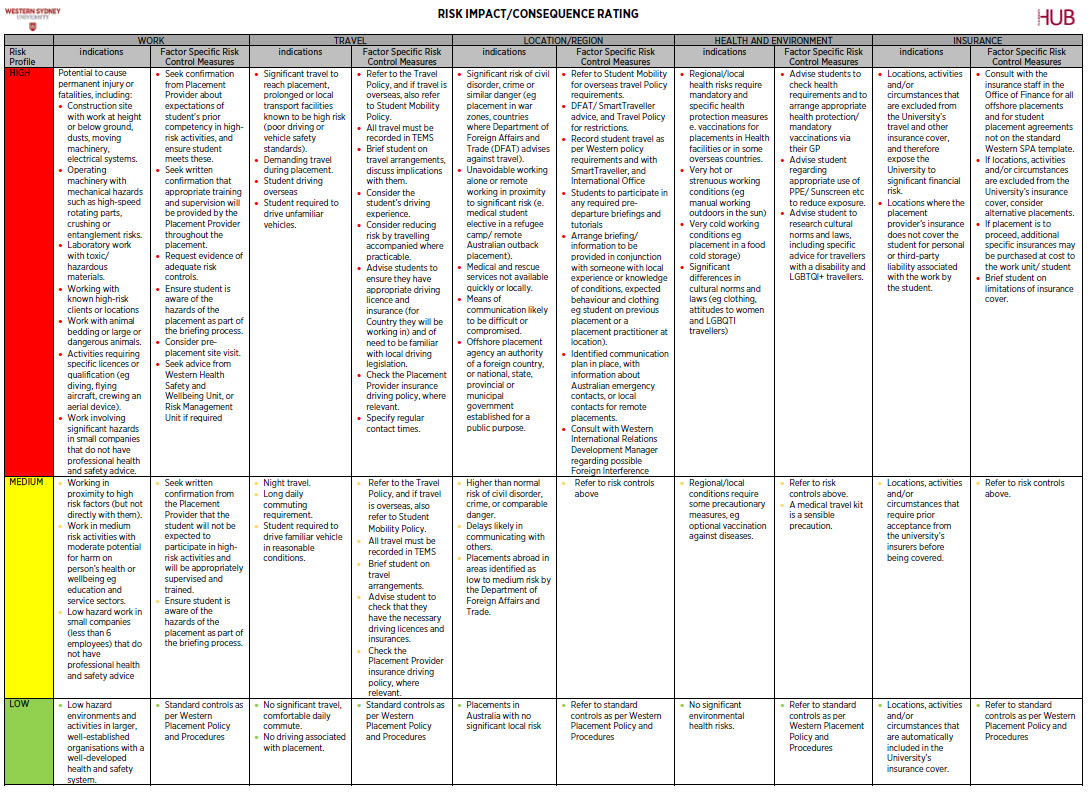Placements, WIL and Managing Risk
Western co-delivers curriculum with many placement and work-integrated learning (WIL) partners. Western's Placement Policy and Placement Procedures provide the principles and administrative controls for placements undertaken as a requirement of any program of study or subject at Western.
MANAGING RISKS
You can document how you assess risks in a variety of ways. The Placement Policy outlines what you must do; the method you choose to assess risk can vary depending on the type of experience, discipline, environment or location. If you'd like to use a structured risk assessment, you can utilise the Office of Audit and Risk's useful workbook. Clauses 14-17 of Western's Placement Policy and clauses 20-26 of Western's Placement Procedures identify the key foundational controls for managing placement risks.HOW TO IDENTIFY AND MANAGE RISKS?
Delivering curriculum in collaboration with partners includes but is not limited to workplace placements, guest lectures, mentoring students, participating in simulations, acting as clients for student consulting teams, participating in student conferences, or collaborating in cooperative research projects.
Managing institutional risk around the co-delivery of placements and work-integrated learning is a strategic, operation and legal responsibility of Western. We demonstrate, via the Higher Education Framework, that “risks to higher education operations have been identified and material risks are being managed and mitigated effectively” (HES Framework, section 6.2.1.e), with placements and WIL being “quality assured, including assurance of the quality of supervision of student experiences” (HES Framework, section 5.4.1). Different risks may apply to the co-creation of curriculum.
Quality assurance and risk management of placements and WIL are interdependent. Western can demonstrate quality assurance through the management of all risks that can impact the delivery and quality of placements and WIL experiences - our agreements are a key action.
What are some of the due diligence can be undertaken to minimise risk and improve quality in placements and WIL experiences?
- All placements are recorded in InPlace (unpaid and paid)
- Document the expectations and obligations of the parties in a written agreement
- Placements are reviewed cyclically, where the results inform and improve quality assurance of placements
- Partner and/or academic supervision is identified
- The student-centric purpose of a placement or WIL is clear
- Learning objectives of the WIL placement and the obligations of the student and partner are clearly articulated
- Any unsuccessful experiences are discussed with the partner to minimise impact upon relationships
- Engage the host by explaining the student’s skills and the benefits of the experience for the agency
- Any special requirements are defined and met by students before allocation and commencement.
 A Placement & WIL Risk Impact/Consequence Rating table has been created using the Universities and Colleges Employers Association UCEA Health and Safety Guidance for the Placement of Higher Education Students (2009), which has been used by UOW, JCU, Exeter University and the University of Essex. Use this Risk Impact / Consequence Rating table and the Likelihood Score table in Western's Risk Assessment Guidelines to determine the Overall Risk Level.
A Placement & WIL Risk Impact/Consequence Rating table has been created using the Universities and Colleges Employers Association UCEA Health and Safety Guidance for the Placement of Higher Education Students (2009), which has been used by UOW, JCU, Exeter University and the University of Essex. Use this Risk Impact / Consequence Rating table and the Likelihood Score table in Western's Risk Assessment Guidelines to determine the Overall Risk Level.
SUITABILITY OF PLACEMENT INFORMATION
The following resource can assist you to manage specific risks with respect to placements and work integrated learning opportunities:
Mobile options:

